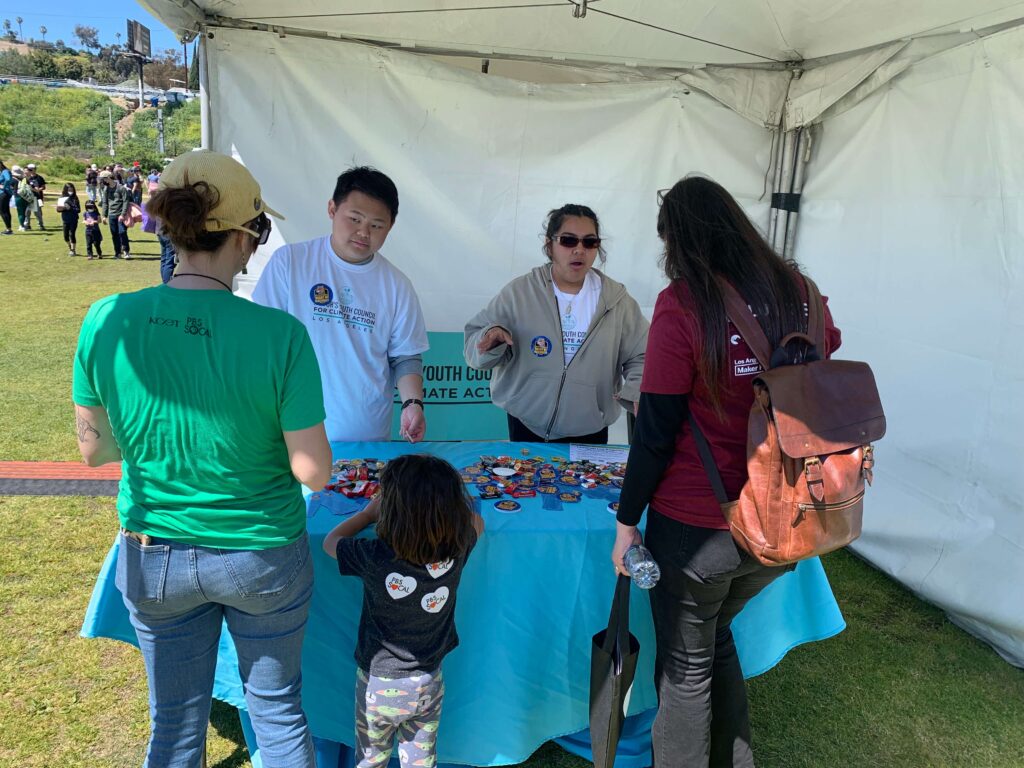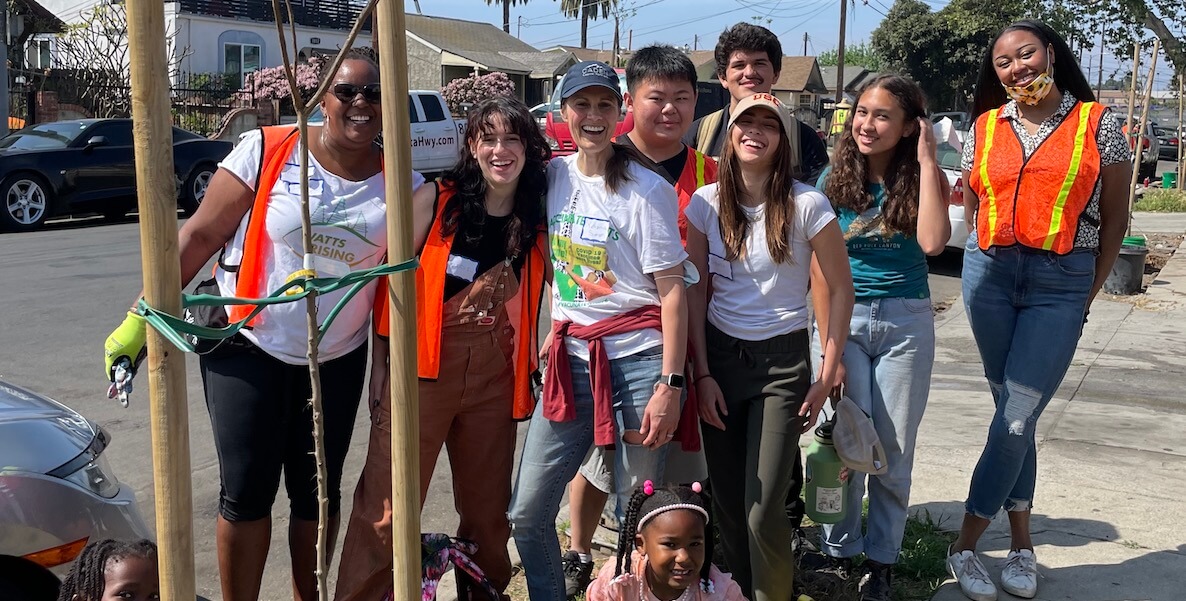In 2015, when Angeleno Caden Kang was 10 years old, natural gas began leaking from a well beneath Aliso Canyon. “I distinctly remember the awful headaches and the nosebleeds that came with the sulfuric air,” he says. “Imagining all of that natural gas being emitted just really makes me sick.”
The leak, partially caused by 60-year-old piping in a SoCalGas facility, released 100,000 tons of methane. Two schools had to close because of the toxic air. Nearly 10,000 families — Kang’s among them — had to temporarily relocate. The incident also caused Kang, now a senior at North Hollywood High School, to join the Los Angeles Mayor’s Youth Climate Action Council.
Launched in 2019 in response to local and national youth climate protests and activism, the L.A. Mayor’s Youth Climate Action Council (MYCCA) is a group of around 14 Angelenos between the ages of 15 and 22 who work with their mayor, City Council and other City employees to set and to work on climate-related goals and initiatives. They set their own agenda — everything from planting trees to resurfacing bus kiosks to shaping policy — and then oversee the work being done.
“I’ve lost a lot of hope in the City Council. I don’t really go to the hearings anymore,” says Sabirah Mahmud. “They don’t really institute spaces for young people to get involved in an accessible way in which they are respected and honored.”
In L.A. and beyond, high school and college-age activists are working alongside members of their city councils and local environmental groups to make a local impact on a global issue: climate destruction and climate change. Youth have long been the faces and the voices behind environmental advocacy. What mayor’s youth climate action councils do is get kids into rooms where they can not only influence decisions and make projects happen — they can also learn how change is made within a government.
As Philly elects a new mayor and other city officials this year, creating our own mayor’s youth climate action council could help us not only reach some of Philadelphia’s current climate goals and set new ones for the future — it could also go a long way in empowering more young Philadelphians to become engaged, empowered and involved citizens in their own rights.
What’s a Mayor’s Youth Climate Action Council?
L.A.’s MYCCA members serve terms from August to May. They begin by voting on initiatives they want to prioritize for the session. The Mayor’s office then connects them with the City resources and non-governmental organizations that can help them achieve their goals.
“The Council is really quite unique in that the members themselves lay out the agenda for their term,” says Victoria Simon, the former executive officer of sustainability for the City of Los Angeles. Simon helped create the Council and until recently worked to support it as an advisor and mentor to the students.
Once they select their initiatives, members divide into subcommittees to complete projects. This year, the council had three subcommittees: the tree committee, the City Council subcommittee; and the expanding Council subcommittee, which promotes youth climate councils in other cities. The Council meets once per month, either in-person or virtually.
“I just really wanted an opportunity to have a voice at City Hall and to continue to drive change with fellow young Angelenos who are just as passionate about addressing the climate crisis,” says Caden Kang.
Malinalli Diaz is a junior at L.A. ‘s Anahuacalmecac International University Preparatory of North America. She joined the Council last year and served as a co-lead of the tree subcommittee, where she worked with the nonprofit Tree People to help plant trees in neighborhoods, like Watts in Southern L.A., with little green space.
Increasing tree canopy can help cities fight climate change by drawing carbon out of the atmosphere and sequestering it underground, offering resilience against extreme heat through their shady branches and reducing flooding by sucking up stormwater. L.A. needs around 90,000 additional trees to protect against extreme heat, the L.A. Times reported.
“We immediately saw the difference [on 109th Place,] to go from having no trees to having a bunch of little baby trees,” Diaz says. This year, the tree subcommittee is partnering with Commonwealth Nursery, a public-private partnership dedicated to raising trees from local seeds, to help give out even more trees. Here in Philadelphia, a youth climate council could connect with our robust tree-planting programs, including Philly Tree People, the Pennsylvania Horticultural Society’s Tree Tenders, and the City’s TreePhilly.
Since its inception, the L.A. Council has created an augmented reality video game that raises awareness about air quality and worked with City Council President Paul Krekorian to develop a zero waste events ordinance, among other initiatives. The United Nations Conference of Parties 26 in Glasgow featured their work. They have also presented on the importance of youth climate action committees at the C40 Global Youth and Mayors Forum.
Councils across the U.S.
Though it was one of the first in the country, L.A. isn’t the only city with a Mayor’s Youth Climate Action Council. Cities from Boise, Idaho, to San Antonio and Austin, Texas, have adopted mayor’s climate action councils. Massachusetts just announced one in the works for the entire state.
Some Youth Climate Action councils work closely with their city governments, while others are created in partnerships between governments and nonprofits. In Texas, the nonprofit EcoRise has helped cities across the state implement their own climate councils. Texan students have offered policy suggestions to city council members, added green roofs to bus shelters, reduced single-use plastics, improved biodiversity, and conducted a number of other initiatives, according to reporting from the education news site 74 Million.
For Kang, being able to work directly with city leaders on climate policy is a major advantage of the council. Before joining MYCCA, he served on the general Mayor’s Youth Council and worked with City Council members on policy ideas. Now, as a co-lead of the City Council subcommittee of MYCCA, he and his team have advised L.A.’s sanitation department on how to manage the zero-waste events ordinance. The subcommittee’s recommendations made it into 14 official City ordinances.
Texan students have offered policy suggestions to city council members, added green roofs to bus shelters, reduced single-use plastics, improved biodiversity, and conducted a number of other initiatives.
“I just really wanted an opportunity to have a voice at City Hall and to continue to drive change with fellow young Angelenos who are just as passionate about addressing the climate crisis,” he says. “I’m a strong believer in the power of collective efforts, and being on the Council entails engaging in thought provoking discussions and listening to the diverse perspectives of my fellow Council members.”
Simon says that bringing young people into discussions about climate policy makes sense: Younger generations are going to be most impacted by the effects of climate policy.
In 2021, a global survey of people aged 16-25 found that 84 percent were at least moderately worried about the effects of climate change. Seventy-five percent said they were frightened for the future and reported feeling betrayed by government officials for their lack of urgency around climate issues. A Pew Research Center poll found that millennials and members of Generation Z rate addressing the causes and effects of climate change as a top policy concern.

“Throughout history we’ve seen that young people aren’t simply the leaders of tomorrow but are often at the vanguard of our country’s most pressing issues,” Simon says. “We cannot dismiss their calls for action but must empower them and invite them into the decision-making process through tangible programs like the Youth Climate Action Council.”
Why Philly needs a Mayor’s Youth Climate Action Council
Sabirah Mahmud is a strategy organizer with Philly Thrive and a student at the University of Pennsylvania. When she was 17 and a student at the Academy At Palumbo, she founded the Philadelphia Youth Climate Strike. Her group led five climate walkouts, where students left class to march through the streets of the city to protest climate inaction. Youth Climate Strike’s largest turnout in 2019 had 4,000 attendees.
Like Kang and many other young climate activists, Mahmud has been personally affected by weather events driven by climate change. Her family is originally from Bangladesh, which has experienced extreme flooding, cyclones and other forms of severe weather — all results of the impacts of climate change. Between 2000 and 2019, the country experienced 185 extreme weather events. It’s estimated sea level rise will displace one in seven people living in Bangladesh by 2050.
“I’ve had losses in my family due to floods,” Mahmud says. “My family who lives there permanently doesn’t deserve the injustice.”
Mahmud says she has tried in vain to work with members of Philadelphia’s City Council. She recalls speaking with Councilmembers and feeling like they weren’t listening to her — and that they didn’t believe she understood climate issues. “I’ve lost a lot of hope in the City Council. I don’t really go to the hearings anymore,” Mahmud says. “They don’t really institute spaces for young people to get involved in an accessible way in which they are respected and honored.”
“You get to learn a lot about how city government works and about how to create change at a governmental level,” Malinalli Diaz says.
Mahmud believes a mayor’s youth climate council would open productive channels of communication. She also believes the City should recruit students of color and those from neighborhoods most impacted by climate change to the group by offering a small stipend.
“Compensation means so much,” she says, explaining that a stipend would also make up for any wages lost from taking time off from after-school jobs. “The climate crisis is not necessarily a White movement. It’s not a priority just for the White people of the city.”
Youth climate action councils aren’t perfect. They’re often limited by short terms of service and members who move away upon graduation. But they can help foster a dialogue between young people and city officials and mobilize young people not only to plant trees or conduct projects that help improve biodiversity — but also to become more civically engaged in general, both locally and nationally, by collaborating with other councils. They might also inspire young people to vote, and, one day, run for office themselves.
“You get to learn a lot about how city government works and about how to create change at a governmental level,” Diaz says. “More voices are needed, more indigenous youth should be participating, more youth of color should be participating. We need youth from different communities.”
![]()
RELATED POSTS ON FIGHTING CLIMATE CHANGE IN PHILADELPHIA



